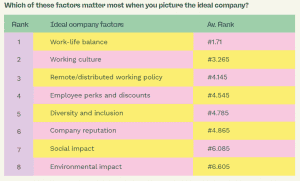Increased flexibility and greater autonomy during the pandemic afforded workers more time to spend pursuing interests outside of work and even spend more time with their children and partners, and most of us decided that we quite liked these changes!
Companies that have remote workers tend to fall into two different types of remote working. Remote companies are either fully or partially remote. Sometimes, they also require people to work from a number of locations. However, central to the majority of remote companies is that most team members have the main office they work at full-time or part-time. With a fully remote company, employees work from wherever they are productive and comfortable. Employees work across different worldwide or UK locations and often work asynchronously.
What we are seeing with many of our clients is that employees are realising that work can and should be different. Remote working has unshackled employees from the office and eliminated the drudgery of the daily commute and it has also led to major shifts in life priorities.
For many, remote work has been a revelation, and as one employee recently said to us when we were visiting them at work, “My eyes have been opened.” Open to what, exactly I asked? Well, according to most of the businesses and employees that we work with there has been a “Great Revelation” which is that work-life balance, and company culture are more important than before the pandemic.
You can see below the latest research from Oyster that shows the key things employees are looking for from their employers:

We are hearing more and more employees say that supportive managers are a must, that salaries need to improve to keep up with rising costs of food, energy and petrol and that, given a choice, they simply won’t return to the previous status quo.
In our survey that we carried out at the beginning of this year with SME business owners and people managers, over 45% of the respondents stated that their biggest challenges this year would be in attracting and retaining employees in their businesses.
How can we help?
If you aren’t looking at how to adapt your ways of working, then you will find it hard to retain the best talent, but also incredibly difficult to attract new employees to join you too.
As an employer creating a retention strategy is paramount right now, and there are many simple things that you can do, that are not particularly costly, to ensure you retain the best talent in your business. If you need some expert help, to create your Employee Retention Strategy, then book a no obligation call with us to discuss some of our best ideas. Book a call here.
Or why not come along to our next Free Workshop via Zoom on Friday 8th April from 9:30-11am on Creating your Employee Retention Strategy. Nearly 70% of organisations report that staff turnover has a negative financial impact on their bottom line due to the cost of recruiting and training a replacement employee and the overtime work of current employees that’s required until the organisation can fill the vacant position.
It’s been estimated that every time an employee leaves you, it can cost 6 to 9 months of that employee’s salary on average to replace them and retrain them. So, there’s a clear financial need for creating an employee retention strategy.
In our workshop, we will share the most actionable employee retention strategies that will help you reduce employee turnover and retain the talent you need to run your business. Book your place on our workshop here.





















